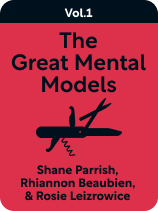

This article is an excerpt from the Shortform book guide to "The Great Mental Models Volume 1" by Shane Parrish and Rhiannon Beaubien. Shortform has the world's best summaries and analyses of books you should be reading.
Like this article? Sign up for a free trial here.
What is second-order thinking? How can it help you make better decisions?
Because we live and act within large, interconnected systems—such as our workplaces or professional communities—our actions have consequences that ripple outward. Since anything you do has downstream effects, you should consider the immediate and secondary effects of any choice.
Read more to learn how to use second-order thinking to everyone’s advantage.
Second-Order Thinking, Explained
What is second-order thinking? According to the authors, many decisions that have immediate positive results have negative consequences down the road. By thinking ahead, you can predict and prevent unwanted outcomes. For example, a struggling business might take on investors to help keep the company running in the short term, but down the road, those same investors might make demands that sacrifice the company’s authentic mission.
(Shortform note: For a real-world example, consider Prohibition, the 1920s attempt to ban alcohol in the United States. Lawmakers didn’t consider the second-order consequences of the ban and, as a result, speakeasies and mob rackets flourished. Al Capone and others made their fortunes smuggling alcohol in from Canada and underground distilleries, and many lost their lives as a result of the ban. In hindsight, it seems obvious that people weren’t going to stop drinking—but hindsight is 20/20, and the lawmakers evidently lacked this mental model.)
The authors describe two lessons you can learn by using second-order thinking:
Lesson #1: Short-term benefits often have long-term consequences. Immediately gratifying actions often have cascading consequences that lead to poor outcomes. The authors contend that seeing this helps you make better decisions now.
(Shortform note: While the authors assert that being able to predict long-term effects helps you make better decisions, this may not hold true. In practice, we often choose based on emotion rather than reason. In Money: Master the Game, Tony Robbins explains that to master something, you need to understand it in theory, commit to it emotionally, and then take action to grasp it in practice. Just knowing something isn’t enough.)
Lesson #2: Explaining ripple effects makes you more persuasive. By showing that you’ve considered the extended consequences of a choice, you can become more persuasive in business and personal relationships.
(Shortform note: Ancient Greek philosophers used three aspects of persuasion: ethos, pathos, and logos. Above, the authors imply that a deeper understanding of systems and ripple effects strengthens the logos, or logic and reasoning, of your argument. While this matters, negotiation expert Chris Voss argues in Never Split the Difference that the emotional aspect of persuasion—pathos—is more important. He suggests using calculated empathy, or understanding someone’s emotional needs in order to get what you want from them. If demonstrating that you’re a clear thinker helps, it might be because it helps the other person feel more confident in your decision-making abilities.)

———End of Preview———
Like what you just read? Read the rest of the world's best book summary and analysis of Shane Parrish and Rhiannon Beaubien's "The Great Mental Models Volume 1" at Shortform.
Here's what you'll find in our full The Great Mental Models Volume 1 summary:
- What mental models are and how they work
- How to make better decisions by using mental models
- How to use your imagination to evaluate your choices






